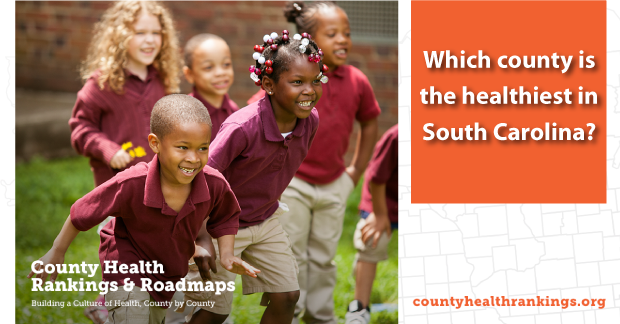 Beaufort County ranks healthiest in South Carolina and Marlboro County is the least healthy county in the state, according to the ninth annual County Health Rankings, released today by the Robert Wood Johnson Foundation (RWJF) and the University of Wisconsin Population Health Institute (UWPHI). The Rankings are available at www.countyhealthrankings.org.
Beaufort County ranks healthiest in South Carolina and Marlboro County is the least healthy county in the state, according to the ninth annual County Health Rankings, released today by the Robert Wood Johnson Foundation (RWJF) and the University of Wisconsin Population Health Institute (UWPHI). The Rankings are available at www.countyhealthrankings.org.
An easy-to-use snapshot that compares counties within states, the Rankings show that where you live influences how well and how long you live. The local-level data make it clear that good health is influenced by many factors beyond medical care including housing, education, and jobs. This year’s new Rankings State Reports show meaningful gaps in health persist not only by place, but also by race and ethnicity. Looking at differences by place and race offers a more complete picture of health. This year’s analyses show that lack of opportunity, such as education, jobs, and affordable housing, disproportionately affects people of color across the nation and within South Carolina.
The new Rankings State Reports call attention to key drivers of health such as children in poverty.
Poverty limits opportunity and increases the chance of poor health. Children in poverty are less likely to have access to well-resourced and quality schools, and have fewer chances to be prepared for living wage jobs. The South Carolina State Report reveals that in South Carolina, 23 percent of children live in poverty, compared to the U.S. rate of 20 percent. Among racial and ethnic groups in South Carolina, rates of children in poverty range from 14 percent to 38 percent with Hispanic children faring the worst and White children faring the best.
“The County Health Rankings illustrate that the health effects of all policies at the state and local level must be addressed,” said Kester Freeman, executive director of the South Carolina Institute of Medicine and Public Health. “It is only by addressing the important drivers of health, including poverty and other gaps in opportunities as shown in this year’s report, that we can improve the health of all who live in South Carolina. The Rankings are an important tool to spark and inform these discussions.”
Our children will become more resilient, and grow into stronger, healthier adults with greater economic opportunities if we build communities with quality education, emotional and social support, access to quality health care, and safe, affordable, and stable housing.
“We can’t be a healthy, thriving nation if we continue to leave entire communities and populations behind,” said Richard Besser, MD, RWJF president and CEO. “Every community should use their County Health Rankings data, work together, and find solutions so that all babies, kids, and adults – regardless of their race or ethnicity – have the same opportunities to be healthy.”
According to the 2018 Rankings, the five healthiest counties in South Carolina, starting with most healthy, are Beaufort County, followed by York County, Charleston County, Greenville County, and Lexington County. The five counties in the poorest health, starting with least healthy, are Marlboro County, Marion County, Dillon County, Allendale County, and Williamsburg County.
“The time is now to address long-standing challenges like child poverty,” said Julie Willems Van Dijk, PhD, RN, director of County Health Rankings & Roadmaps. “This year’s Rankings are a call to action to see how these persistent health gaps play out locally, take an honest look at their root causes, and work together to give everyone a fair shot at a healthier life.”
The South Carolina County Health Rankings & Roadmaps team collaborate on several efforts highlighting the Rankings. The Rankings are informing the Alliance for a Healthier South Carolina’s Population Health Summit, which will bring together community-based multi-sector health improvement coalitions for a collaborative learning experience through video conferencing in June 2018, and the South Carolina Institute of Medicine and Public Health’s Workforce for Health Taskforce to produce recommendations for a workforce focused on prevention, community settings and the social-environmental determinants of health.
For more than 40 years the Robert Wood Johnson Foundation has worked to improve health and health care. We are working with others to build a national Culture of Health enabling everyone in America to live longer, healthier lives. For more information, visit www.rwjf.org. Follow the Foundation on Twitter at www.rwjf.org/twitter or on Facebook at www.rwjf.org/facebook.
The University of Wisconsin Population Health Institute advances health and well-being for all by developing and evaluating interventions and promoting evidence-based approaches to policy and practice at the local, state, and national levels. The Institute works across the full spectrum of factors that contribute to health. A focal point for health and health care dialogue within the University of Wisconsin-Madison and beyond, and a convener of stakeholders, the Institute promotes an exchange of expertise between those in academia and those in the policy and practice arena. The Institute leads the work on the County Health Rankings & Roadmaps and the RWJF Culture of Health Prize. For more information, visit http://uwphi.pophealth.wisc.edu.

